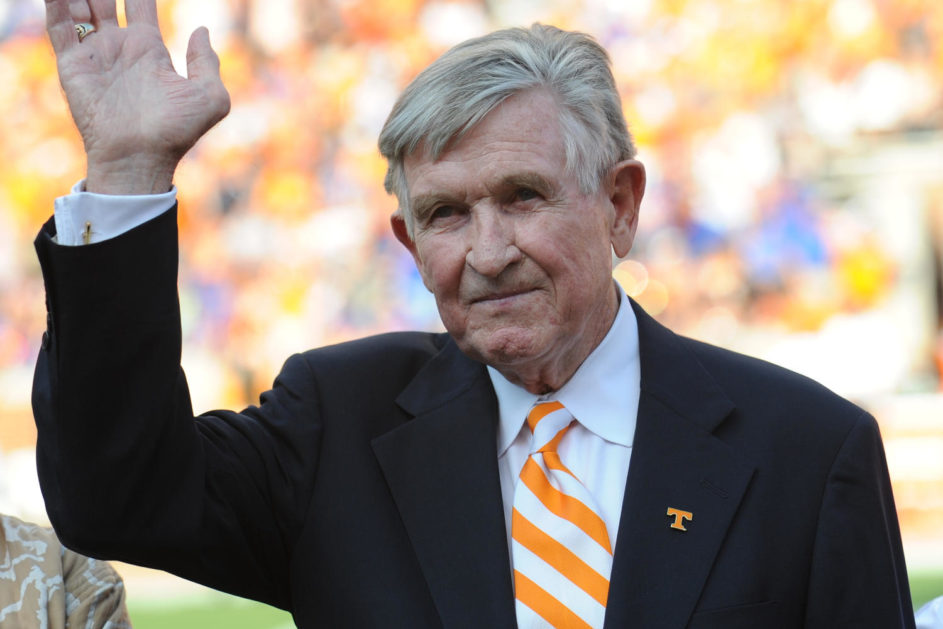Getting to 2-0 is going to be a problem for the Vols. Let us delay next-game discussion.
I applaud the Tennessee-Pittsburgh agreement to be partners in the Johnny Majors Classic, to honor the memory of the former coach at both places.
John led the 1976 Panthers to a national championship. The single best thing he did at Pitt was beat Penn State in a recruiting race for Tony Dorsett.
Majors was an all-American tailback with the Volunteers in 1956, twice player of the year in the Southeastern Conference and runner-up for the Heisman Trophy. He is in the College Football Hall of Fame as a star Volunteer.
Majors the coach started rebuilding the Tennessee program in 1977. It took a while. He was 116-62-8 with the Vols. His combined record at Iowa State, Pitt, UT and Pitt again was 185-137-10. Everywhere he went, reconstruction was waiting.
Majors died June 3 of last year. He was buried in Lynchburg, alongside his parents, Shirley and Elizabeth Majors, and his brother Bill.
When Vol fans talk about all-time greats, Majors is in the conversation with Peyton Manning, Doug Atkins, Reggie White and Bob Suffridge, Tennessee’s only three-time all-American.
There is no statue but there is a street, Johnny Majors Drive, on the campus. Like the forthcoming Classic, it is misnamed. His mother insisted that his name was John and that’s that.
As it says in my second book, Legends of the Tennessee Vols, Majors was a triple threat. He was a high school legend at Huntland, 35 touchdowns as a senior, 17.7 yards per carry. Please reread those numbers.
He was a college legend, leader of a really great team, not quite big enough in comparison with those around him, maybe 5-11 and 175 in his letter sweater, just one of the boys, but a giant in the race for the biggest national honor that should have been his.
He was a coaching legend for one special season at Pitt and three or four really good ones at Tennessee. On many Saturdays and on his Sunday TV program, he was fun ‘n games, a big part of the show. He talked too fast but it was clear he loved his work. He won some games unexpectedly and lost a few he should have won. He promoted pride and recruited with a passion.
As a player and coach, Majors was an uncompromising competitor who never stopped believing and never lost sight of his goal.
“I always had a strong desire not to let down people who were counting on me.”
Majors came from a legendary football family, most famous ever in Tennessee. His father’s coaching record was so good, it looked like a typographical error. His mother could have taught Competition 101. The five boys won distinction in football. Their sister was a cheerleader. The Majors clan was close.
John didn’t look a lot like a star player. Teasing teammates called him “Bird Legs.”
He looked a lot better when the ball was snapped. His mind was two steps ahead of most. He made hundreds of correct decisions. He followed blockers skillfully. He was the passer and punter and safety on defense. He was leathery tough and maybe a bit too fearless for his own good.
In the beginning, there were doubts about whether he could play in the big league. Farmer Johnson, Tennessee line coach way back when, invited the three-time state scoring leader to become a Volunteer. Associates needled Farmer about bringing in a boy to play with men. John had his own concerns. He really wondered if he was good enough.
This is the cold, hard truth: He weighed 144 after two weeks of freshman practice but his nimbleness caught the eye of Robert R. Neyland, then the athletics director.
“Who’s number 10?” asked the General from a distance.
Coach Johnson was delighted to answer “Majors from Huntland, Sir.”
Neyland later validated his first impression by declaring Majors the best all-around tailback he ever saw. Compliments don’t get any better than that.
The script called for Majors to be red-shirted in ‘54 but injuries thinned the depth chart. He was activated after the program had been printed for the opener against Mississippi State in Memphis.
In the second quarter, Johnny broke a spinner trap for 80 yards and a touchdown. Famous scribes in the old press box, properly befuddled, were asking each other “Who’s that?”
The sports editor of the university newspaper, a kid named West, knew the answer. He and John were in the same geography class.
There were a lot of could and should-have-beens in Majors’ career. He probably should have become the coach at Tennessee one cycle earlier than he did. The very unhappy ending didn’t fit an all-time favorite son.
Majors was shocked and madder than hell to be pushed out. He felt his alma mater betrayed him. He said, big and loud, that he had been stabbed in the back. He hung very descriptive words on those he perceived as villains. Pittsburgh picked him up on the rebound. His return as head coach was an emotional boost but a practical failure.
On Saturday, at the home half of the Classic, let us focus on this summation: Keep on keeping on, win some, lose some, but fight on. Never, ever give up. Remember the best of times – down and out to Buddy Cruze, terrific victory at Georgia Tech, all-American, Miracle at South Bend, Sugar Vols, hall of fame, great guy if you like warriors.
In addition to remembering Majors, do buy tickets to the Pitt game and purchase Classic souvenir apparel to make the celebration more fun for UT.
Marvin West welcomes reader comments or questions. His address is marvinwest75@gmail.com.

